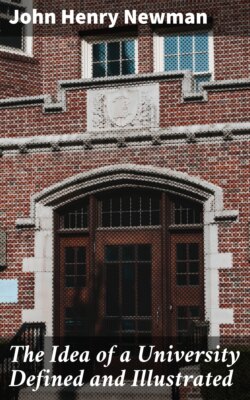Читать книгу The Idea of a University Defined and Illustrated - John Henry Newman - Страница 48
На сайте Литреса книга снята с продажи.
13.
ОглавлениеTable of Contents
I am getting to the end of this Discourse, before I have noticed one tenth part of the instances with which I might illustrate the subject of it. Else I should have wished especially to have dwelt upon the not unfrequent perversion which occurs of antiquarian and historical research, to the prejudice of Theology. It is undeniable that the records of former ages are of primary importance in determining Catholic doctrine; it is undeniable also that there is a silence or a contrariety abstractedly conceivable in those records, as to an alleged portion of that doctrine, which would be sufficient to invalidate its claims on our acceptance; but it is quite as undeniable that the existing documentary testimony to Catholicism [pg 095] and Christianity may be so unduly valued as to be made the absolute measure of Revelation, as if no part of theological teaching were true which cannot bring its express text, as it is called, from Scripture, and authorities from the Fathers or profane writers,—whereas there are numberless facts in past times which we cannot deny, for they are indisputable, though history is silent about them. I suppose, on this score, we ought to deny that the round towers of this country had any origin, because history does not disclose it; or that any individual came from Adam who cannot produce the table of his ancestry. Yet Gibbon argues against the darkness at the Passion, from the accident that it is not mentioned by Pagan historians:—as well might he argue against the existence of Christianity itself in the first century, because Seneca, Pliny, Plutarch, the Jewish Mishna, and other authorities are silent about it. Protestants argue in a parallel way against Transubstantiation, and Arians against our Lord's Divinity, viz., on the ground that extant writings of certain Fathers do not witness those doctrines to their satisfaction:—as well might they say that Christianity was not spread by the Twelve Apostles, because we know so little of their labours. The evidence of History, I say, is invaluable in its place; but, if it assumes to be the sole means of gaining Religious Truth, it goes beyond its place. We are putting it to a larger office than it can undertake, if we countenance the usurpation; and we are turning a true guide and blessing into a source of inexplicable difficulty and interminable doubt.
And so of other sciences: just as Comparative Anatomy, Political Economy, the Philosophy of History, and the Science of Antiquities may be and are turned against Religion, by being taken by themselves, as I [pg 096] have been showing, so a like mistake may befall any other. Grammar, for instance, at first sight does not appear to admit of a perversion; yet Horne Tooke made it the vehicle of his peculiar scepticism. Law would seem to have enough to do with its own clients, and their affairs; and yet Mr. Bentham made a treatise on Judicial Proofs a covert attack upon the miracles of Revelation. And in like manner Physiology may deny moral evil and human responsibility; Geology may deny Moses; and Logic may deny the Holy Trinity;12 and other sciences, now rising into notice, are or will be victims of a similar abuse.
